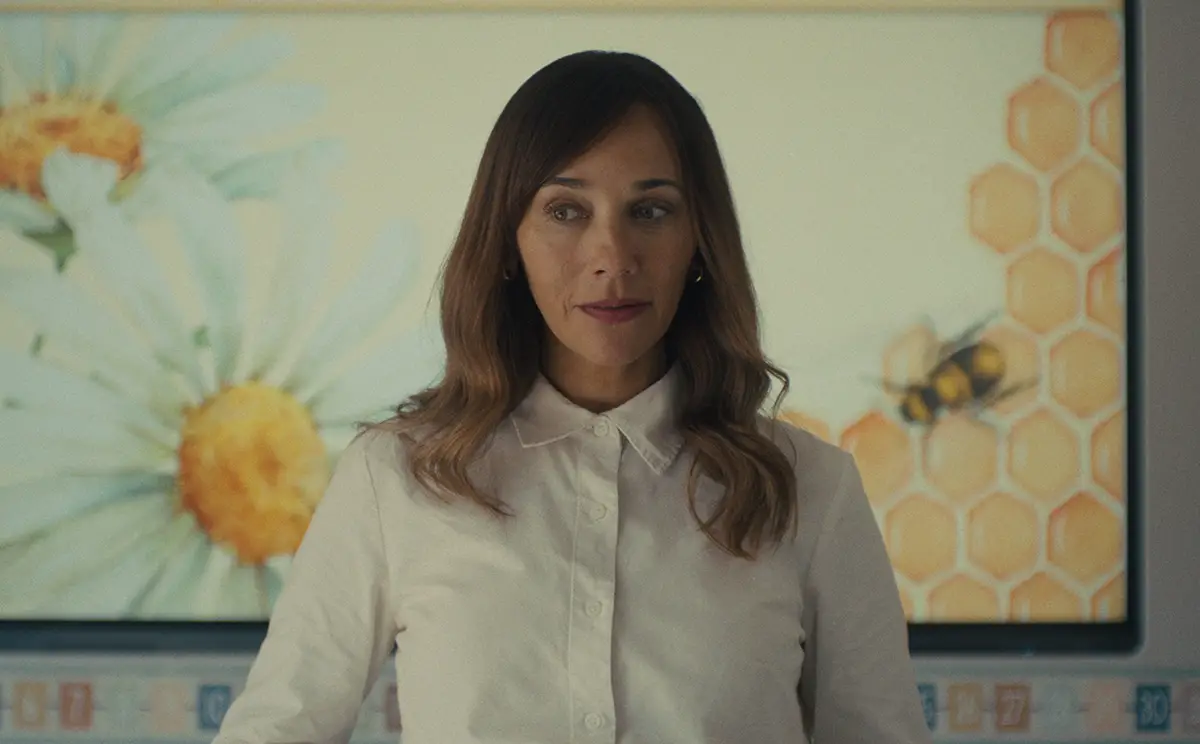Black Mirror is back, and Season Seven feels like a return to the show’s original roots—diving deep into the complexities of human emotion, all filtered through the ever-unforgiving lens of how we use and misuse technology. But how well does the season’s opening episode fit into these themes?
Exploring love, desperation, and digital dependency, the debut episode unpacks the devastating lengths people will go to for those they care about when placed under crushing financial, emotional, and ethical pressure.
Plot Overview

“Common People” focuses on a couple, Mike, a working-class welder, and Amanda, a schoolteacher. After Amanda collapses at work and is diagnosed with a severe, inoperable brain tumour, all hope seems lost for a smooth or stable recovery. That is, until a cutting-edge biotech company called Rivermind offers an alternative: a radical procedure that removes the tumour and replaces part of Amanda’s brain with synthetic tissue, kept alive through the company’s private server system. While the operation itself is free, the service requires an ongoing monthly subscription to keep Amanda conscious and functioning.
At first, the couple manage—though they’re forced to make difficult lifestyle and work changes to stay afloat. But Rivermind’s subscription model quickly expands, and the cracks begin to show. Stuck on the most basic “Common” plan, Amanda begins experiencing disturbing breaks from reality, channelling targeted advertisements aloud during conversations, which begins to jeopardise her personal and professional life. Desperate, Mike upgrades her to higher-tier plans, plunging them into financial ruin. As the pressure mounts, Mike turns to live-stream gigs on a humiliating platform, where he performs increasingly degrading and violent stunts for money. One year later, unable to afford the escalating costs and with Amanda reduced to a lifeless echo of her former self, she makes the unthinkable decision: to have Mike end her life.
Themes and Commentary

Throughout the episode, “Common People” offers a sharp critique of how businesses exploit their power over consumers, making services accessible only through ongoing financial dependency. It highlights the disturbing implications of subscription-based models when applied to something as fundamental—and intimate—as human consciousness.
On average, Americans now spend approximately $90 a month on subscription services—and that figure shouldn’t come as a surprise. More often than not, businesses have shifted towards monthly payment models instead of one-time fixed costs. This growing trend has sparked a deeper question: do consumers actually own the services they pay for, or are they simply renting convenience? Why pay $7.99 for a single DVD when you could put that same amount toward a month of access to a streaming platform that offers hundreds of titles? “Common People” takes this logic one step further—applying it to the human experience itself. Do you truly have full autonomy over your own existence if you’re forced to pay for that “right”?
Easter Eggs and References

Packed with subtle nods and layered details, “Common People” offers several connections to the wider Black Mirror universe, rewarding eager-eyed, long-term fans:
- “Anyone Who Knows What Love Is (Will Understand)”: Initially introduced in Season One episode “Fifteen Million Merits”, this soulful Irma Thomas track has become a recurring motif throughout the series. It symbolises human vulnerability and sincere connection in a world increasingly shaped by cold, exploitative technology.
- The Juniper Restaurant: Mike and Amanda celebrate their anniversary each year at a restaurant called The Juniper—a likely reference to the beloved Season Three episode “San Junipero”, which also explored themes of love, memory, and digital consciousness.
- Skillane Legal: In one scene in the Rivermind offices, eager-eyed viewers may notice a nameplate reading “Skillane” across the hall—a chilling nod to Victoria Skillane, the central character in the Season Two episode “White Bear”.
Final Thoughts
“Common People” is a haunting and emotionally charged return to form that leans into the bleak realities of capitalism, healthcare, and emotional sacrifice—delivering exactly what Black Mirror does best. Anchored by strong performances, grounded storytelling, and an unsettlingly believable premise, the episode explores the human cost of systems we’ve grown disturbingly comfortable with.



